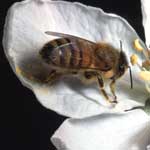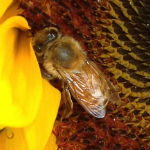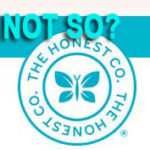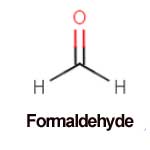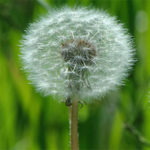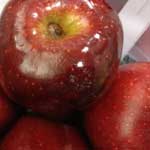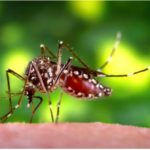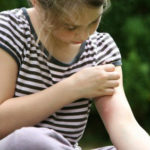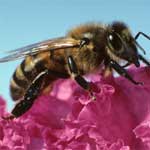"The Devil, the Details, and 'Consensus' for 'TSCA Modernization,' Angela Logomasini. For some reason, there’s always near “consensus” when Congress passes environmental laws that later become controversial (for data, see my study from 2008 on this topic). There are probably two key reasons for this. First, no member wants to appear “anti-environmental” by voting against “green” legislation; and second, few members are paying much attention to the details. And that’s what appears to be … [Read more...]
Organic Fertilizer Killing Bees?
"Organic Fertilizer Is Great at Killing Bees," by Ruth Kava. A given of the organic agriculture movement is that organic growers don’t use synthetic pesticides and fertilizers, like organophosphates and glyphosate (RoundUp). All that fear-mongering about pesticides is only possible because environmental groups only test for the synthetic kind, they don’t test for the pesticides and fertilizers used by organic growers. Because those are safer? Absolutely not. In the Journal of Economic … [Read more...]
NRDC Lies
"NRDC Scientists Are Lying in the Weeds," by Josh Bloom There has been a long-running scare campaign against the commonly-used herbicide 2,4-D, which has been conducted by a number of environmental groups, the Natural Resources Defense Council being at or near the front of the pack. NRDC uses the time-tested strategy of equating 2,4-D with Agent Orange — the notorious herbicide that was used to defoliate swaths of Vietnam during the war. The name Agent Orange itself sounds scary, and the … [Read more...]
A Word from a Toxicologist
"A Word from a Toxicologist who Defected from the Federal Junk Science Army," By John Dale Dunn. Last week, I discovered Frank Schnell when he wrote a comment on formaldehyde and said it was not a cancer-causing agent and that the EPA had lied about it. His comment was on an American Council on Science and Health posting by Josh Bloom, Ph.D. (organic chemistry), with a 20-year history of pharmaceutical research. Bloom busied himself in the post eviscerating a scare-monger on formaldehyde from … [Read more...]
Still No Beepocalypse
"Near 20-Year High: Bee-pocalypse Postponed Again," By News Staff at Science 2.0. Despite the hype, there’s still no bee-pocalypse. Two weeks ago, the U.S. Department Agriculture released its latest count of commercial honeybee hives, and although the figure dipped 2.9 percent from the 20-year record-high set in 2014, the overall count of 2.7 million hives in 2015 remains strong. You wouldn’t know it from the news coverage. One Michigan television station recently led with the headline: … [Read more...]
BPA Science
"If It’s Science vs. Motherhood, Can Science Ever Win?" By Ben Miyares. In a bit of unfinished business, California’s Office of Environmental Health Hazard Assessment (OEHHA) added bisphenol A (BPA) to its Proposition 65 list of chemicals “known to the state to cause reproductive toxicity” last year. It now proposes to amend the rule. I say “unfinished business” because listing of the chemical requires businesses that expose individuals to more than a California-determined level of the chemical … [Read more...]
Reality Check for the Chemical Industry
"Trust in Government: A Bad Strategy for the Chemical Industry," by Angela Logomasini, Ph.D. There is a reason why people laugh when you say: “Trust me, I come from the government.” Governments are not particularly trustworthy because bureaucracies are not particularly efficient, and when they are efficient, there’s sometimes more reason to fear than trust. Yet for the past several years, the chemical industry has been trusting the idea that giving more power to feds will save them from a … [Read more...]
California Holds Back on Misleading BPA Warning Labels
"California Pulls Back on BPA Warnings – Quality of Information Trumps over Quantity," by BPA Coalition. Recently, there has been a lot of coverage on the other side of the Atlantic on the decision by the Californian Office of Environmental Health Hazard Assessment (OEHHA) to delay the implementation of “point-of-sale” warning label for products made out of BPA-based materials. The warning would have to be displayed where a customer pays for products in a shop. This decision exemplifies the … [Read more...]
BPA Use in Canned Food is Safe
"Before You Give Up Canned Food, Read This," by Center for Accountability in Science. It’s been a big week for BPA news. First, Campell’s announced it was phasing out the use of BPA in its canned foods. Then several environmental activist groups released a report finding that over 60 percent of canned foods still use BPA. But before you start throwing out your canned goods over health fears, let’s break down the research. There’s a reason BPA is used in canned foods. Read more. … [Read more...]
Alarmism, not Science, Guides Debate on Flame Retardants
"Outdated Science And Alarmism Drives Flame Retardant Debate," By Angela Logomasini. Learning from history should keep us from repeating our mistakes. Yet when it comes to environmental politics, the opposite seems to be true. History and improved scientific understanding fail to inform, while alarmism and irrational fears drive policy. The current debate related to flame retardant chemicals is a prime example. Environmental activist groups have petitioned the Consumer Product Safety … [Read more...]
Not So Green Products
"Shady Marketing Claims for "Green" Cleaning Products," by Richard Morrison. The Wall Street Journal reports today on the murky world of marketing for “green” and “natural” household products. Ads for these flower-scented and creatively-named brands often claim—or, at least, strongly imply—that they are safer and healthier that mainstream cleaning and deodorizing agents. Such claims are often made even when both products are chemically similar or borderline identical. Read more. … [Read more...]
Do We Need Government Flammability Standards for Furniture?
"Doing Away with Government Flammability Standards," By Angela Logomasini. During the past several years, there’s been much hype in the news alleging that flame retardant chemicals used on upholstered furniture pose unacceptable health risks. With these alarmist claims abounding, some green minded individuals complain that they unknowingly purchased couches that contain these chemicals because furniture manufacturers apply them to meet government flammability standards. To address this concern, … [Read more...]
EWG’s Annual Spring Deception
"Can We Just Enjoy Spring This Year? By SafeFruitsandVeggies.Com." The welcoming of spring brings many positives such as better weather, flowers and trees in bloom, an even bigger variety of fruits and veggies to enjoy and more daylight hours for outside activities. However, for those of us who work to provide credible food safety information to consumers, it also brings a predictable negative event that requires a corrective response – the annual release of the “dirty dozen” list by the … [Read more...]
Untrustworthy Government Science
"Government Scientists are Squandering the Public’s Trust," Center for Accountability in Science. Who do you trust to tell you whether the products you buy are safe? Bloggers like the Food Babe who crow about “yoga mat” chemicals in bread? Or federal environmental and health regulators who review scientific research and determine which products are safe for consumers? According to a recent ORC poll commissioned by the Center for Accountability in Science, respondents overwhelmingly placed the … [Read more...]
The Roundup on Life-Saving Weedkillers
"Glyphosate Saves Lives, Reduces Child Labor, and More," By Angela Logomasini. David Zaruk, aka the Risk Monger, has produced an excellent series of blog posts on why the herbicide glyphosate (the active ingredient in “Roundup”) is a wonderful thing, despite “cancer classifications” and demonization by greens. In a refreshingly blunt and honest series of posts, he makes some fantastic points that must shock green activists who can’t imagine why anyone would dare use a chemical to control … [Read more...]
(Dis)Honest Company: Scientifically Deceitful
"Why the Jessica Alba Detergent Fiasco Matters," by Josh Bloom. The juicy details of what I’ve named “Waterspot Gate” — the utter farce that could not have possibly made Jessica Alba’s The Honest Company look worse— mostly involve a series of intentional misstatements and outright lies about the company’s products. They only serve to throw more dirt into the grave that the company itself dug. Wall Street Journal reporter Serena Ng, whose thorough and tireless research peeled away one lie after … [Read more...]
Dirty Facts about Honest Company Detergents
"Waterspot Gate? Jessica Alba’s Detergent Claims are All(bs)," By Josh Bloom. Have we gotten so stupid that we are willing to believe the toxicological and environmental gibberish that we are now hearing from Jessica Alba? It would seem so, since the company created by the actress — who never went to college, yet has clearly earned an honorary B.P. degree (Bachelor’s of Prettiness) — managed to extract $1.7 billion from suckers who were convinced that substituting one harmless detergent for … [Read more...]
Children Liberated with Pesticides
"The Pre-Glyphosate Generation: I was a Child Labourer," By David Zaruk, The Riskmonger. Do you ever wonder why elementary schools close during July and August? Historically, children were needed to work in the farms then, in particular to pull weeds. Before herbicides were developed, this back-breaking job of hand weeding crops landed on the littlest limbs. Growing up on a mixed fruit and vegetable farm in Southern Ontario, I was one of those child labourers. In the 1960-70s, the Zaruks ran a … [Read more...]
Save the Monarchs: Keep Them off the ESA!
"Regulation Poses Biggest Threat to Monarch Butterflies," By Angela Logomasini. Like many nature lovers and gardeners, last year I launched a milkweed garden for monarch butterflies, starting from seed. After a long summer of manually picking pesky milkweed bugs and aphids off the plants, I noticed one monarch caterpillar. Success! I hope that caterpillar made it to the butterfly stage, and then took off to Mexico where many monarchs overwinter. My efforts represent a tiny part of a larger … [Read more...]
Don’t Worry About Pesticide Residues
"10,000 New Reasons Not To Worry About Pesticide Residues," by Steve Savage. Each year, the farmers around the world who produce our food (fruits, vegetables, grains) get the equivalent of a “grade” on a giant “group project.” For 2014 they got another A+ as they have for many years. The “test” entails thousands of food samples, which the USDA collects from normal US food channels and then scrutinizes for pesticide residues using extremely sensitive laboratory testing methods. Read more. … [Read more...]
Zika And Spurious Associations
"Organic Consumers Association Doubles Down On Pesticides And Zika Claims," by Hank Campbell. Organic Consumers Association, which funds Denier For Hire cabals like the anti-science group U.S. Right To Know, has baffled the science community once again by just making stuff up. When groups made claims that a larvicide named pyriproxyfen was part of a Monsanto conspiracy to promote Zika to give Monsanto a problem to solve(1), they were dismissed by even Washington Post reporters, so OCA has … [Read more...]
The “Science” of Carcinogens
"War On Science: Bogus Human Carcinogens," by Frank Schnell. In the last 15 years, EPA has invented three bogus human carcinogens: dioxin, formaldehyde, and TCE. Prior to the late 1990s, EPA’s cancer Risk Assessment Guidelines (CRAGs) required sufficient evidence of a cause-and-effect relationship in humans before a substance could be classified as a “known human carcinogen”. However, during the late 1990s, EPA modified its CRAGs to allow itself to classify substances as known human carcinogens … [Read more...]
Still Not So Honest Company
"Once Again, Tests Show Jessica Alba’s Honest Company isn’t so Honest," By Center for Accountability in Science. Jessica Alba has developed a personal care and cleaning product empire based on the premise that her products are “safer” that other brands on the market. But once again, testing reveals that one of her popular products contains ingredients she likes to claim could be harmful to consumers. This week, The Wall Street Journal reports that two independent lab tests of the Honest … [Read more...]
Controlling Zika
"DDT or DEET to Stop Zika? Not So Obvious," by Josh Bloom. The surest way to avoid worrying about getting the Zika virus is avoid being bitten by a mosquito transmitting it. That means sales of repellents are very likely to boom. Almost all products to keep mosquitoes away contain the active ingredient N,N-diethyl-meta-toluamide, commonly called DEET. Even the CDC recommends it. Read more. … [Read more...]
Neonics Not Harming Bees
"The Idea that Neonics Threaten Bees a Misguided Notion," By Peter Borst. The honey bee, whose problems we've heard so much about in recent years, forms a key partnership with farmers and agriculture. Yet, in a misguided effort to "save the bees," New York's Legislature is now considering measures that will drive a wedge between beekeepers and farmers, potentially damaging to both. More than four decades of professional experience in beekeeping and bee research has convinced me that the … [Read more...]

